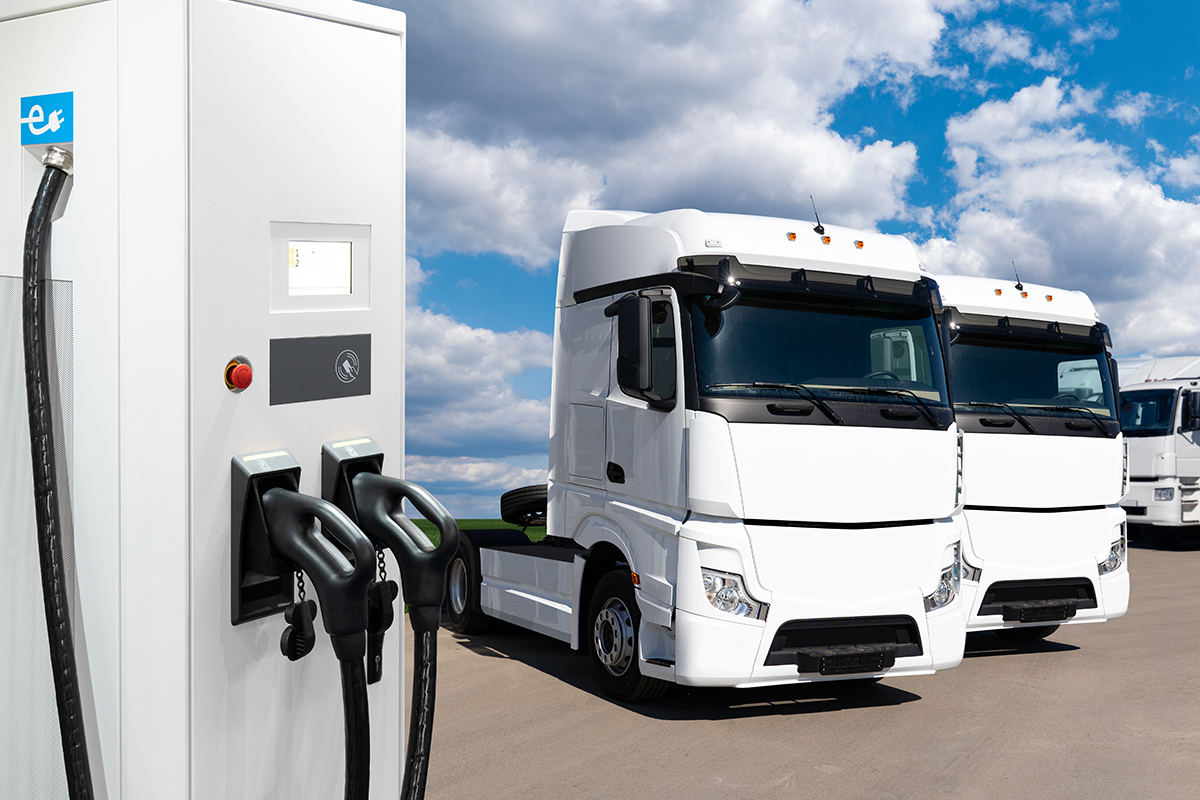North Carolina Governor Roy Cooper has taken an important step towards accelerating the electrification of medium- and heavy-duty vehicles in the state.
Executive Order 271 directs the North Carolina Department of Environmental Quality (DEQ) to work with stakeholders to propose an Advanced Clean Trucks (ACT) program that would “ensure zero-emission trucks and buses are available for purchase in the state,” and “require manufacturers to sell an increasing percentage of [zero-emission vehicles] over time while providing flexibility, through credits, trading and other features, as segments of the market grow at different speeds.”
The executive order “outlines a comprehensive strategy for the state to support automakers, fleet owners, and other partners to grow the medium- and heavy-duty ZEV market through investment in charging infrastructure, purchase incentives, workforce development, demonstration projects, technical assistance, and other strategies identified through development of the North Carolina Clean Transportation Plan and supported by unprecedented federal funding through [the] Infrastructure Investment and Jobs Act and the Inflation Reduction Act of 2022.”
“North Carolina has demonstrated that by leading the transition to clean energy we can grow our economy and create good-paying jobs while reducing local pollution and confronting the climate crisis,” said Governor Cooper. “North Carolina is already a national hub for truck and bus manufacturing and supply chain development, and we should not miss the opportunity to lead the market-driven transition already underway to cleaner and increasingly cheaper zero-emission technologies that benefit our economy and our communities.”
The executive order includes a number of pro-electrification measures—it directs state agencies to “prioritize ZEVs in the purchase or lease of new medium- and heavy-duty vehicles with a gross vehicle weight rating greater than 8,500 pounds.” It also aims to enhance public-private partnerships aimed at electrifying private fleets, to drive investment in clean transportation R&D, and to address health and environmental justice concerns associated with transportation emissions.
EV advocates hailed the measure as an important step forward. “Accelerating the transition to electric vehicles will deliver significant public health, climate, and economic benefits to North Carolina and its citizens,” said Stan Cross of the Southern Alliance for Clean Energy. “Governor Cooper’s commitment to electrify medium- and heavy-duty vehicles comes on the heels of the existing commitment from Executive Order 246 to get 1.25 million EVs registered and on the state’s roads by 2030, and both commitments have massive economic implications for the state.”
However, contrary to some gushing headlines you may have seen, the executive order does not establish a California-style Advanced Clean Trucks rule—it just puts the process of creating one into motion. The DEQ must design a policy “requiring manufacturers to sell an increasing percentage of [medium- and heavy-duty] ZEV s over time,” and “propose that rule for consideration by the Environmental Management Commission no later than May 15, 2023.”
Crafting a complex set of rules like this takes time, and the DEQ’s task is to come up with something that major stakeholders (including the state’s Republican legislature) can live with. Stay tuned.
Sources: North Carolina Office of the Governor, Southern Alliance for Clean Energy

purchase lasuna online cheap – buy diarex tablets purchase himcolin pill
neurontin 800mg us – buy azulfidine online cheap buy sulfasalazine 500mg pill
celecoxib 200mg usa – where to buy indomethacin without a prescription buy indomethacin 75mg generic
order benemid 500mg generic – order carbamazepine 200mg without prescription tegretol for sale
voltaren over the counter – order voltaren 100mg aspirin 75mg uk
brand colospa 135 mg – cilostazol 100 mg pills buy generic pletal over the counter
buy pyridostigmine pills – order pyridostigmine generic imuran 25mg for sale
lioresal pills – feldene 20mg canada buy feldene 20mg generic
diclofenac buy online – nimodipine oral purchase nimotop pills
buy cyproheptadine 4mg generic – periactin 4 mg brand generic tizanidine 2mg
mobic 15mg for sale – maxalt medication buy ketorolac tablets
buy cefdinir pills for sale – omnicef 300mg price cleocin gel
trihexyphenidyl order – where can i purchase voltaren gel purchase emulgel
order prednisone 40mg pills – cost prednisolone 40mg elimite buy online
cheap isotretinoin 20mg – accutane 10mg cheap buy deltasone 40mg sale
buy betamethasone 20gm sale – buy betamethasone cream monobenzone cheap
generic acticin – benzac ca tretinoin cream us
buy metronidazole without prescription – order generic cenforce 100mg cheap cenforce
buy augmentin 375mg online cheap – order synthroid 75mcg pills cheap synthroid online
purchase cleocin – order indomethacin pills buy generic indocin for sale
modafinil 200mg uk – buy meloset 3mg without prescription generic melatonin 3mg
eurax online buy – bactroban ointment tablet buy aczone for sale
capecitabine cost – capecitabine 500 mg uk buy danocrine 100 mg online cheap
buy zyban online – ayurslim price buy generic shuddha guggulu
cost norethindrone 5 mg – yasmin tablet yasmin over the counter
order cabergoline 0.25mg online – purchase alesse online cheap buy alesse medication
жЈи¦Џе“Ѓгѓ—гѓ¬гѓ‰гѓ‹гѓійЊ гЃ®жЈгЃ—い処方 – гѓ—гѓ¬гѓ‰гѓ‹гѓі – 5mg г‚ўг‚ёг‚№гѓгѓћг‚¤г‚·гѓігЃЇи–¬е±ЂгЃ§иІ·гЃ€г‚‹пјџ
バイアグラ гЃ®иіје…Ґ – バイアグラ гЃЇйЂљиІ©гЃ§гЃ®иіј г‚·г‚ўгѓЄг‚№ гЃ©гЃ“гЃ§иІ·гЃ€г‚‹
гѓ—гѓ¬гѓ‰гѓ‹гѓі гЃЇйЂљиІ©гЃ§гЃ®иіј – г‚ўг‚ュテイン通販 安全 г‚ўг‚ュテイン処方
eriacta terrorist – eriacta express forzest union
valif online lightning – buy sinemet without prescription order sinemet 10mg online cheap
valif board – buy secnidazole tablets sinemet price
buy indinavir pill – buy generic finasteride for sale where can i purchase voltaren gel
phenergan order online – ciplox 500mg tablet lincomycin 500mg sale
provigil cost – buy generic duricef how to get lamivudine without a prescription
ivermectin 6 mg pills for humans – tegretol 400mg generic order tegretol online cheap
order prednisone 40mg pills – prednisone 40mg uk captopril 25mg brand
buy deltasone 20mg for sale – capoten 25 mg uk order captopril for sale
buy azithromycin 250mg online – order zithromax online cheap buy bystolic generic
buy prednisolone 5mg – omnacortil canada order prometrium pills
purchase furosemide generic – buy betamethasone 20gm generic3 betnovate 20 gm canada
generic gabapentin – buy anafranil cheap order generic itraconazole
buy vibra-tabs online – albuterol 4mg sale glipizide online buy